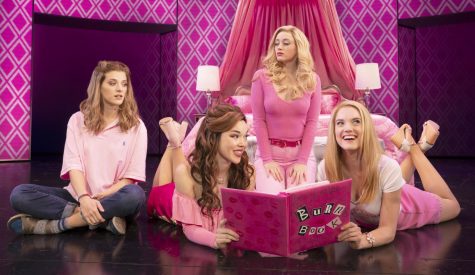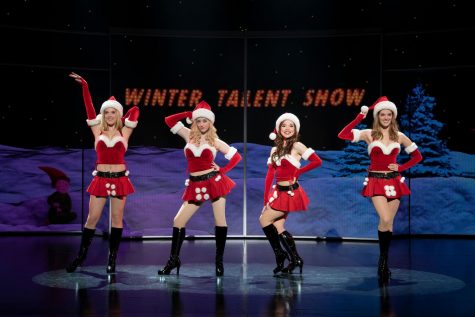Q&A: The nicest ‘Mean Girl’ there is, Mariah Rose Faith as Regina George
January 20, 2020

“Mean Girls” will take place at the James M. Nederlander Theater, 24 W. Randolph St., through Sunday, Jan. 26.
Revisiting the land of misfit cliques known as high school, “Mean Girls” the musical reminded us that in “Girl World,” the limit does not exist with how “fetch” and satirically difficult it is to be a girl in high school.
And yes, you could still see the musical even if you do not wear pink on Wednesdays.
The comedy-musical—which took over the James M. Nederlander Theater, 24 W. Randolph St., through Sunday, Jan. 26—featured the new girl at a suburban Illinois high school, Cady Heron, played by Danielle Wade, who attempts to befriend the school’s it-crowd after moving there from Kenya. She becomes entangled in a trio of mean girls, known as the “Plastics,” led by ring leader Regina George, played by Mariah Rose Faith, who determines the rules of popularity at the school.
The show paralleled the plot-line of the original 2004 film written by Tina Fey, with some added original music and minor plot adjustments.
The added songs aligned with the story and reemphasized the difficulties of high school. The musical number “Apex Predator”—sung by Mary Kate Morrissey, who played Janis Sarkisian—added more context to the show by describing Regina George and her merciless rule over the social hierarchy, asking, “Will she braid your hair; will she eat your heart?”
Faith shed her Plastics persona to speak with the Chronicle about portraying the queen bee, the musical’s message about feminism and staying true to oneself.
THE CHRONICLE: What made you want to take on the role of Regina George?
FAITH: When I first heard the album, back when it came out, I was just like, these songs are absolute insanity. … Then, when I started thinking about how fun it is to play a villain, and someone that’s also just your everyday villain, it’s [a] really interesting take into your own life. It was also a better way to understand those people that are so different from myself.
How do you relate to your character?
In a lot of ways I don’t relate to her but in a lot of ways I’ve had to ask myself where I could exist and [in] what universe I could have been her. We’re both very direct people. I’ve also interpreted my Regina to be very entertained by herself, so a lot of the times when she’s being mean, she’s thinking she’s being comical, or it’s all just a joke, which I’m very entertained by myself. But I don’t make cruel humor. It’s not my thing, but it’s definitely her, so I think I just try to understand where that could come from, just by seeing my own tendencies in real life.
What advice would you give your younger self going into high school?
You don’t always have to be the funniest in the room; you don’t always have to be the prettiest in the room, or whatever your opinion on that is because it really is so subjective to you. You’re going to have more fun if you don’t care so much about what other people are thinking about you. … Try and find real friends and people who really care about you to build you up because there’s no use in investing energy in others who have selfish intentions and don’t really care that much about you.

“Mean Girls” will take place at the James M. Nederlander Theater, 24 W. Randolph St., through Sunday, Jan. 26.
Do you view “Mean Girls” as a feminist story?
Absolutely, but it’s also so weird because—I wouldn’t view it this way, but so many people do or they go, “Feminist story, that means it’s for girls”—but it’s absolutely not just for girls or for women, if you identify that way. [It] follows a young girl who goes along with these tropes of high school that are so hard for young women and now, especially in this age of social media for everybody, it hits close to home in that way.
Do you consider yourself a feminist?
It’s so interesting because I would say I’m very passionate about being a feminist, which some people take like it’s such a negative light, which is so weird to me. I don’t know how you could not be passionate about being a feminist when there are so many [strides] to still be done. … I feel very passionately about [it] so you know, if people disagree with me, that’s OK.
This is a great show, too, because it’s led by female leads and we have three female stage managers and somebody female on the creative team. I mean, written by [Fey] alone, it’s really awesome to be a part of it.
What message do you hope women take away from the show?
There’s so much in the beginning [of the show] that talks about how to be popular, which is also just how to be powerful. And I think, especially when we’re young, we try to mold ourselves or just highlight certain parts of ourselves that we think will be likable by others when really, it’s just if we own our own power and who we are; that’s what’s exciting to other people in the world around us and also more exciting for yourself because you just get to have an amazing time being you. That’s what this show really is—[to] be so excited in your own individuality.







